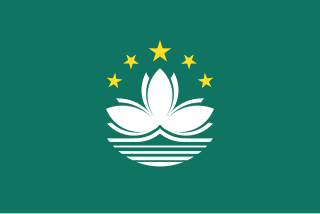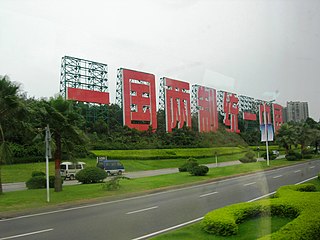Related Research Articles

The politics of Hong Kong takes place in a framework of a political system dominated by its quasi-constitutional document, the Hong Kong Basic Law, its own legislature, the Chief Executive as the head of government and of the Special Administrative Region and of a politically constrained multi-party presidential system. The Government of the Hong Kong Special Administrative Region of the People's Republic of China is led by the Chief Executive, the head of government.

Macau or Macao is a special administrative region of the People's Republic of China. With a population of about 710,000 people and a land area of 32.9 km2 (12.7 sq mi), it is the most densely populated region in the world.
Politics of Macau is a framework of a politically constrained multi-party presidential system, dominated by the People's Republic of China. It includes the legislature, the judiciary, the government, and a multi-party system. Executive power is exercised by the government, led by the Chief Executive.

The special administrative regions (SAR) of the People's Republic of China are one of four types of province-level divisions of the People's Republic of China directly under the control of its Central People's Government, being integral areas of the country. As a region, they possess the highest degree of autonomy from China's central government. However, despite the relative autonomy that the Central People's Government offers the special administrative regions, the National People's Congress and its Standing Committee remains capable of enforcing laws for the special administrative regions.
Chinese law is one of the oldest legal traditions in the world. The core of modern Chinese law is based on Germanic-style civil law, socialist law, and traditional Chinese approaches. For most of the history of China, its legal system has been based on the Confucian philosophy of social control through moral education, as well as the Legalist emphasis on codified law and criminal sanction. Following the Xinhai Revolution, the Republic of China adopted a largely Western-style legal code in the civil law tradition. The establishment of the People's Republic of China in 1949 brought with it a more Soviet-influenced system of socialist law. However, earlier traditions from Chinese history have retained their influence.

"One country, two systems" is a constitutional principle of the People's Republic of China (PRC) describing the governance of the special administrative regions of Hong Kong and Macau.

Edmund Ho Hau Wah, GOIH, GML, GCM is a Macau politician who served as the first Chief Executive of the Macau Special Administrative Region from 1999 to 2009. He currently serves as a Vice-Chairman of the Chinese People's Political Consultative Conference.

The chief executive of the Macao Special Administrative Region is the head of government of Macau, a special administrative region of China. The position replaced the office of Governor of Macau, the former head of Macau as an overseas province of Portugal. Under the Basic Law of Macau, the chief executive's role is to:
...be the head of the Macau Special Administrative Region and shall represent the Region. The Chief Executive of the Macau Special Administrative Region shall be accountable to the Central People's Government and the Macau Special Administrative Region in accordance with the provisions of this Law.
The Basic Law of the Macao Special Administrative Region of the People's Republic of China is the organic law that establishes the Macau Special Administrative Region, replacing the Estatuto Orgânico de Macau. It was adopted on 31 March 1993 by China's National People's Congress and promulgated by President Jiang Zemin; it came into effect on 20 December 1999, following the handover of Macau from Portugal to China.

The handover of Hong Kong from the United Kingdom to the People's Republic of China was at midnight on 1 July 1997. This event ended 156 years of British rule in the former colony, which began in 1841.

The government of the People's Republic of China is based on a system of people's congress within the parameters of a unitary communist state, in which the ruling Chinese Communist Party (CCP) enacts its policies through people's congresses. This system is based on the principle of unified state power, in which the legislature, the National People's Congress (NPC), is constitutionally enshrined as "the highest state organ of power." As China's political system has no separation of powers, there is only one branch of government which is represented by the legislature. The CCP through the NPC enacts unified leadership, which requires that all state organs, from the Supreme People's Court to the President of China, are elected by, answerable to, and have no separate powers than those granted to them by the NPC. By law, all elections at all levels must adhere to the leadership of the CCP. The CCP controls appointments in all state bodies through a two-thirds majority in the NPC. The remaining seats are held by nominally independent delegates and eight minor political parties, which are non-oppositional and support the CCP. All government bodies and state-owned enterprises have internal CCP committees that lead the decision-making in these institutions.

Chinese nationality law details the conditions by which a person holds nationality of the People's Republic of China (PRC). The primary law governing these requirements is the Nationality Law of the People's Republic of China, which came into force on September 10, 1980.

Under the Basic Law, Macau's diplomatic relations and defence are the responsibility of the central government of China. Except diplomatic relations and defence, nonetheless, Macau has retained considerable autonomy in all aspects, including economic and commercial relations, customs control.

The Macao Special Administrative Region of the People's Republic of Chinapassport is a passport issued to Chinese citizens who are permanent residents of the Chinese Special Administrative Region of Macau.
The Property Law of the People's Republic of China is a property law adopted by the National People's Congress in 2007 that went into effect on October 1, 2007. The law covers the creation, transfer, and ownership of property in the mainland of the People's Republic of China (PRC) and is part of an ongoing effort by the PRC to gradually develop a civil code. it contains all aspects of property law in the PRC's legal system.

The Joint Declaration on the Question of Macau, or Sino-Portuguese Joint Declaration, was a treaty between Portugal and the People's Republic of China over the status of Macau. The full name of the treaty is Joint Declaration of the Government of the Portuguese Republic and the Government of the People's Republic of China on the question of Macau. Signed on 26 March 1987, the Declaration established the process and conditions of the transfer of the territory from Portuguese rule to the People's Republic of China. The Joint Declaration served also as the main source of fundamental rights that were implemented in the Basic Law of the Macau Special Administrative Region. The process was otherwise similar to the handover of Hong Kong to Chinese sovereignty by the United Kingdom in 1997.

The Hong Kong and Macao Work Office, concurrently known as the Hong Kong and Macao Affairs Office of the State Council (HMO), is an administrative office of the Central Committee of the Chinese Communist Party responsible for promoting cooperation and coordination of political, economic, and cultural ties between mainland China and the Chinese Special Administrative Regions of Hong Kong and Macau. It was formed in 2023 on the basis of then State Council's HKMAO. Its head office is in Xicheng District, Beijing.

The Sino-Portuguese Treaty of Peking was a trade unequal treaty between the Kingdom of Portugal and the Qing dynasty of China, signed on 1 December 1887. It is counted by the Chinese as among the unequal treaties in the aftermath of the Second Opium War. The treaty gave Portugal perpetual colonial rights to Macau on the condition that Portugal would cooperate in efforts to end the smuggling of opium.

Capital punishment in Macau was formally abolished in 1976 and reiterated in the Penal Code of Macau in 1995.

Secession in China refers to several secessionist movements in the People's Republic of China. Many current separatist movements in China arise from the country's ethnic issues. Some of the factors that have created these ethnic issues include history, nationalism, economic and political disparity, religion, and other factors. China has historically had tensions between the majority Han and other minority ethnic groups, particularly in rural and border regions. Historically, other ruling ethnicities, such as the Manchu of the early-Qing dynasty, experienced ethnic issues as well.
References
- ↑ "East Asia/Southeast Asia :: Macau – The World Factbook – Central Intelligence Agency". www.cia.gov. Retrieved 2019-06-25.
- ↑ "Macau". United States Department of State. Retrieved 2022-05-20.